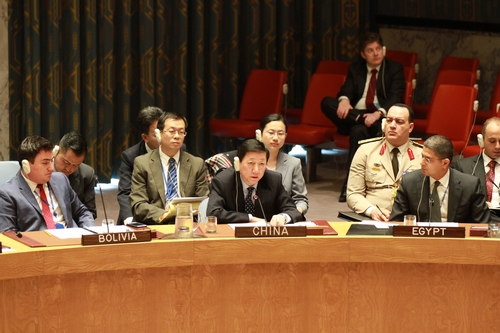| Statement by Ambassador WU Haitao at the Security Council Briefing on UN Peacekeeping Operations |
| 2017-05-23 03:54 |
|
Let me begin by thanking Under-Secretary-General Lacroix and the Force Commanders of the four missions for their informative briefings. China would like to pay tribute to the Force Commanders and peacekeepers of all United Nations peacekeeping forces in active service for their extraordinary courage and dedication. We also extend our condolences to the families of all those peacekeepers who have made the ultimate sacrifice in the line of duty. The current international situation is undergoing profound change. Peacekeeping operations face ever increasingly complex environments and mandates, and we face serious challenges in carrying out effective peacekeeping operations. Informative briefings by the force commanders enable the Security Council to have a comprehensive understanding of peacekeeping mission in the field and of the efforts made by peacekeepers to deliver their mandates. I would like to make the following points. First, the basic principles of peacekeeping operations are still of great relevance as guidance in the new context. The purposes and principles of the Charter of the United Nations and the consent of the parties concerned, impartiality and the non-use of force, except in self-defense and for the defense of mandates, are the irreplaceable cornerstone of peacekeeping operations. Such operations should properly handle the relations with the host country, respect its sovereignty and heed its views and suggestions. In line with the wishes of the host country, the Security Council should appropriately address the issues of exit strategy for peacekeeping missions. Secondly, political solutions to regional hotspot issues should be pursued proactively. Some of those issues are protracted and persistent and lead to the deterioration of the security situation in the region concerned. In some mission areas, there is no peace to keep. That has had a serious and adverse impact on the implementation of mandates by other peacekeeping missions deployed in the same region. The international community should therefore have a greater sense of urgency and redouble its efforts to promote political solutions to regional hotspot issues. Peacekeeping operations should achieve synergy and coordination to create an enabling environment for achieving political solutions to the hotspot issues. Thirdly, it is important to improve the mandates of peacekeeping operations, making them realistic and actionable. In recent years, the protection of civilians has become one of the mandates for the relevant United Nations peacekeeping missions. That mandate should be implemented upon respect for the ownership of the host country. The scope, conditions and terms of reference of implementation should be developed. Such mandate needs to be a useful supplement to the actions by the host country. Given the limited human and material resources, at the level of implementation and policy, we should develop specific rules governing the protection of civilians. Fourthly, we must ensure a smooth transition from peacekeeping to peacebuilding, development and reconstruction. United Nations peacekeeping operations should timely adjusts its mandates and size, in the light of specific conditions and developments on the ground. They should strengthen coordination with actors such as countries in the regions concerned, regional and subregional organizations, United Nations development agencies, the World Bank and the International Monetary Fund. Peacekeeping operations should also undertake efforts to meet the needs of the host country, provide tailored support to help with security capacity-building and assist the host country in achieving self-reliant development at an early date. Nine out of sixteen current United Nations peacekeeping missions are in Africa. The top 12 troop-contributors are African countries. Strengthening communication and coordination with African countries in the area of peacekeeping is an inevitable requirement for effectively improving peacekeeping operations. China supports the United Nations in carefully listening to the views, suggestions and concerns of African countries in the area of peacekeeping operations. China strongly supports African peacekeeping capacity-building. China has been a staunch supporter of and an active participant in United Nations peacekeeping operations. It is the largest troop-contributor among the permanent members of the Security Council and second largest contributor to the peacekeeping budget. China is fully implementing the commitments announced by Chinese leaders concerning our support for United Nations peacekeeping operations. We will increase our communications with the Force Commanders in the field, and we stand ready to join other Member States in efforts to improve UN peacekeeping operations and to maintain international peace and security. |
| |||||||||||||
| |||||||||||||
